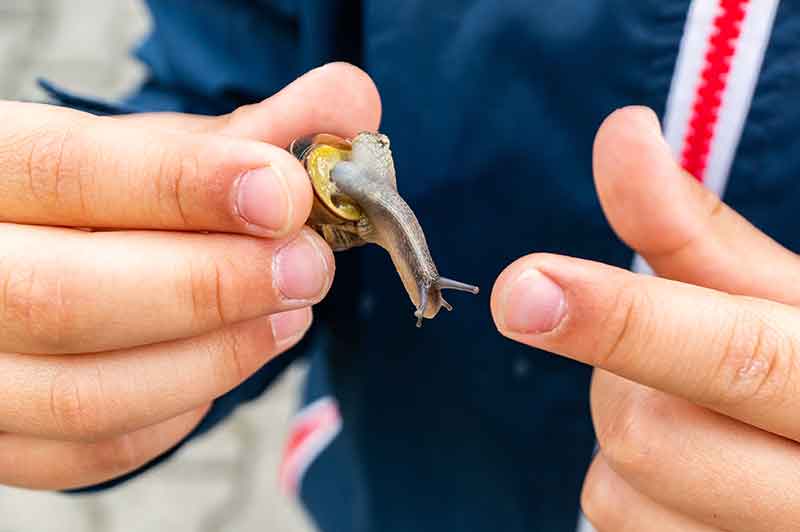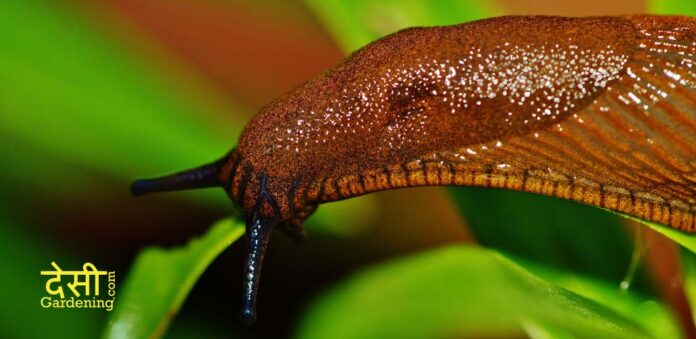Namaskar Desi Gardeners. Before we talk about how to get rid of snails and slugs, let me tell you something very important.
Snails and slugs look pretty harmless, these move very slowly and nobody thinks that these can kill us. Yes, kill us!
World Health Organization (WHO) estimates that the freshwater snails kill at least 20,000 people every year. That is more people killed by lions, tigers, sharks or crocodiles!!
Well, the snail and slug will not bite or scratch you but it carries parasites. If you touch its skin or its wet trail while you have been gardening, which does happen, wash your wash very well. If the parasites enter the human body it infects us with schistosomiasis and rat lungworm due to which people get sick, feel nauseous, a lot of pain in the whole body and during urination and excretion with blood. If untreated, these diseases can cause death.
So my gardener friends please be aware of these harmless and squishy bugs. After you have kept yourself safe, let us see how we can protect our plants from these pests.
Stop Snails From Eating Away Your Plants
Snails come out after sunset. They target fresh green leaves, hibiscus being one their favourite. These can munch away young saplings overnight. If there is a weaker plant, it will be their target. Snails need calcium to maintain their shell for which these eat sand as well as soil.
In the day they will find cool, shaded places to rest like under the pots. They live under the stones, in the drainage routes or inside pipes. Once it rains, the snails and slugs become more active.
Having a few snails in the garden is normal. Some birds like the Greater Coucal feast on them. But in the absence of their predators we start to have too many snails and these start to eat away the leaves of the plants.
In my garden, the snails and slugs usually target two of my beautiful hibiscus plants. I do not know why they leave the other hibiscus and target only these two plants. Every morning I can see that the lower leaves have been chewed in places. Of course, this puts the plant in a lot of stress. Although the plant is full of buds, the flowering has become slower.
Why is my plant not blooming? – Rose, Hibiscus and Kalanchoe

Does organic pest control really work? The Honest Answer
These snails and slugs will also eat flowers, buds, soft branches and fruits if they get the chance. Here are some methods to try to get rid of these.
Keep it on a stand. This is something I tried and it worked. If you increase the height such that the snails have a long way to go up, it will work. Also change the position of your pots regularly. Snails and slugs follow the same route as habit and by removing the pot you can give relief to the plant temporarily.
Egg shells. As these insects have a soft belly underneath, they avoid crawling on hard or sharp objects. Break a few eggshells and put it around your plant. It will also provide nutrition to the soil.
Sea shells. Do you have broken sea shells? Do the same. Put it around your plant base. Not only are sea shells a good source of calcium for the soil but it will last longer than egg shells.
Phenyl. If you have all your plants in pots like I have, try spraying little phenyl around it. It has worked for me but I do not use it regularly as it is not organic.
Coffee grounds. I have not tried this one but many gardeners say it has worked for them. Spread coffee grounds around the base of the plant. Snails and slugs probably hate the smell of it. I hope instant coffee powder will also work. Let me know in the comments if you have tried it.
Beer trap. Many people swear this works very well. They put a bowl or container with beer inside the soil with the rim just above the soil. The smell of beer attracts the slugs and these drink and drown. I have not tried it yet to be honest.
Tapes. Copper tapes, cello tapes, black tapes – the tapes can be used to act as a barrier. Sticky surface or a slippery surface will discourage these bugs.
Garlic. Just like vampires, snails and slugs hate garlic. Garlic is a great organic pest repellent. Ground a handful of garlic and mix in water. Put in around the plants or spray it.
You can also grow garlic plants which will discourage these insects as well as many other pests.
Wheat bran, rice husk. The rough outer layer of rice or wheat is commonly used a mulch. Rice husk is also used in preparing the soil as it keeps it aerated. However if you use wheat, corn or rice husk as a mulch around the base of your plants snails and slugs will have a harder time reaching the plant .The best thing is that snails and slugs will eat it and die due to dehydration.
Just make sure you get good quality and dry bran and husk.
Woodchips and sawdust. Just like husk, woodchips and sawdust will act as mulch and also protect your plants.
Gravel and pebbles. The trick is to make it difficult for them and stones and pebbles will do it well. Plus, it can also jazz up your garden if you do it right. See here for different types of gravel, pebble and marble for your garden.
Pesticides. There are some pesticides in the market that can be used for severe infestation of snails and slugs. Use it only if your organic solutions have not worked.
Five Gardening Mistakes We Do That Kill Our Plants
Get Rid of Slug/Snail Eggs
Even if you do your organic pest control and mulch, there is still a chance that snails and slugs have laid their eggs around your garden. They will lay tiny eggs under your pots, under the rim of your pots and containers or in any shaded and dark place. During the rainy season when it is difficult to access the garden, the army of bugs will be munching away happily all of your precious plants.
It is important that you should keep your garden very clean. Swipe away the fallen leaves.
Regularly check broken or unused pots. We all keep aside containers for later use and these become the perfect spots for inviting snails and slugs.
Do not put fresh cow dung or vegetables leftovers directly from your kitchen. All manures should be properly composted and prepared before you give on the plants. Applying it directly can attract many more insects and also cause plant diseases.
Get Rid Of Ants And Mealybugs Using These Simple Techniques
Ref: www.sciencealert.com/here-s-a-list-of-the-top-15-deadliest-animals-on-earth
View this post on Instagram





























